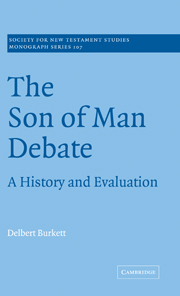Book contents
- Frontmatter
- Contents
- Preface
- List of abbreviations
- Introduction
- 1 Genealogical interpretations
- 2 The human Son of Man
- 3 The apocalyptic/messianic Son of Man
- 4 The question of reference
- 5 The question of authenticity
- 6 Miscellaneous sons of men
- 7 Exit the apocalyptic Son of Man?
- 8 The idiomatic/nontitular son of man
- 9 Son of Man in apocalyptic and rabbinic texts
- 10 Conclusions
- Appendix Surveys of research on “the Son of Man”
- List of references
- Index of passages
- Index of authors
- Index of subjects
8 - The idiomatic/nontitular son of man
Published online by Cambridge University Press: 15 October 2009
- Frontmatter
- Contents
- Preface
- List of abbreviations
- Introduction
- 1 Genealogical interpretations
- 2 The human Son of Man
- 3 The apocalyptic/messianic Son of Man
- 4 The question of reference
- 5 The question of authenticity
- 6 Miscellaneous sons of men
- 7 Exit the apocalyptic Son of Man?
- 8 The idiomatic/nontitular son of man
- 9 Son of Man in apocalyptic and rabbinic texts
- 10 Conclusions
- Appendix Surveys of research on “the Son of Man”
- List of references
- Index of passages
- Index of authors
- Index of subjects
Summary
The dissolution of the apocalyptic Son of Man consensus in the 1960s brought with it a new emphasis on the interpretation of “son of man” as a nontitular idiom. In 1990 Reginald Fuller saw a trend toward interpretations of this kind:
There appears … to be a trend (it is no more) to ascribe the christological-titular use to the post-Easter community, while allowing that the earthly Jesus used it in some non-titular sense, whether generic or self-designatory.
(Fuller 1990: 721–22)This type of interpretation has a long history, going back to the Reformation. While patristic and medieval authors interpreted ὁ υἱὸς τοῦ ἀνθρώπου in its Greek sense, Reformation scholars began to examine the possible Semitic background of the phrase, usually tracing it to Hebrew ben adam or Aramaic bar enasha. While most scholars continued to view the expression as some sort of title, others began to see it as a nontitular idiom. Three possible idiomatic senses of the expression were investigated: the circumlocutional sense (“this man” = “I”), the generic sense (“man” in general), and the indefinite sense (“a man,” someone).
A circumlocution for “I”
Phase 1: 1557–1835
As early as 1557, Theodore de Bèze (Beza) appealed to Hebrew idiom to account for the expression “son of man.” Noting that Jesus spoke of the son of man in the third person while apparently referring to himself, Beza suggested that the expression was a Hebrew idiom, used as a circumlocution for “I”:
since the Hebrews are accustomed to speak of themselves in the third person, this phrase is to be taken in place of a first personal pronoun in the Gospel history, in which I do not remember anyone except Christ alone called “son of man,” and this exclusively when he speaks about himself.
- Type
- Chapter
- Information
- The Son of Man DebateA History and Evaluation, pp. 82 - 96Publisher: Cambridge University PressPrint publication year: 2000



